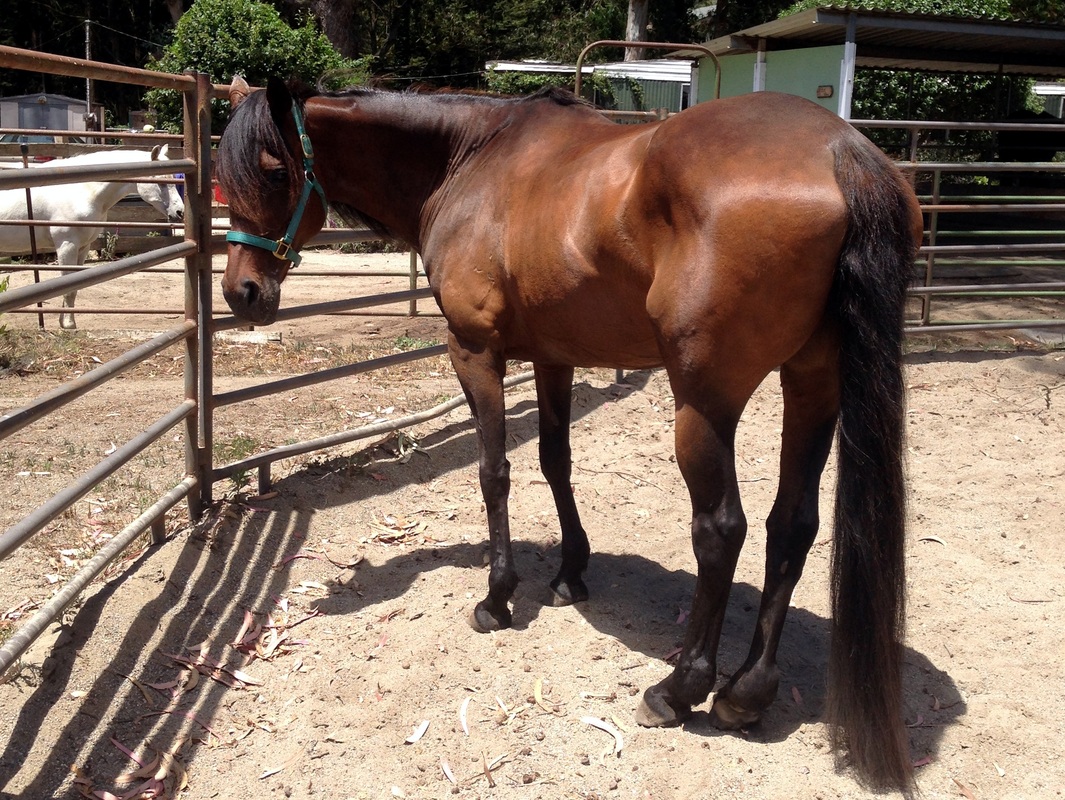|
by Marlissa Campbell, Contributing Writer So, you've been taking horseback riding lessons for a while, you feel that you've got the basics down, and you really love the animals. You've learned to groom and muck out stalls, and you even kind of enjoy the tangy smell of manure -- after all, where there's horse muck, there's horses! You long for a horse of your own, and have started to save up. Then one day a friend of a friend from the barn tells you about a horse that's available for free, or for a nominal price that you can easily afford. Of course, you're told, it's a terrific horse and absolutely perfect for you.
It happens more often than you might think, especially in today's poor economy. A horse owner loses their job, or a marriage breaks up, and suddenly their beloved mount becomes a financial drain they can't handle. All they want is a good home for their friend, but they need it now, and can't wait for a buyer with a few thousand dollars to hand. Their misfortune is your lucky day. No more lesson fees, and you can ride whenever you want. Your dream of a horse all your own, to love and pamper, is coming true. What could possibly go wrong? As is true for any animal, the purchase price is only the smallest tip of the iceberg of overall cost. In the case of a horse, that iceberg can be of Titanic-sinking proportions. So what's a horse-mad person to do? Here are ten tips that will help you make sure you're ready to make your dream a reality. 1. Choose carefully -- Chose a horse that is at least basically trained to do the kind of riding you want to do. You should be able to get on and have fun right away. Unless you're an experienced trainer, an untrained, unrideable free horse is no bargain. Rule out any horses that are too young to have been trained, or who otherwise haven't been trained to ride for any reason. Having some famous horses in its pedigree still doesn't make an untrained horse a good deal. Quality training is expensive and it takes time. Don't imagine that you can buy a book or video and do it right yourself. 2. Take someone with you -- Take someone who knows your skills and knows horses well -- someone who can't be seduced by big brown eyes and flashy coat color. If you don't have a friend who fits the bill, a lot of trainers and instructors will go with you to evaluate a potential horse. You'll need to pay their expenses plus a fee to be agreed ahead of time. It's well worth it to have someone along to talk you out of making a potentially dangerous and expensive mistake. The current owner should ride first, then your trainer, and only then you. Too many people get hurt trying out prospective horses. Don't be one of them. 3. Get the vet out -- Have at least a basic pre-purchase veterinary exam even on a free horse. Don't expect perfection, but expect a horse that's sound and healthy enough to do the activities you want to do with it. A vet can tell you if there's any evidence of injury or disease requiring expensive treatment and affecting rideability as of the day of the exam. You don't want to get your new horse home only to find a nasty, costly surprise. On the other hand, a flaw that might not look great to the casual eye, such as poor muscle development, could be readily correctable with proper feed and exercise. 4. Make a budget -- You'll have expenses of various types. One-time expenses include equipment such as tack and grooming gear. Regular monthly expenses include boarding and feed. Other regular expenses include hoof care, worming, vaccinations, and dental care. And there is always the potential for unexpected injury and illness requiring veterinary care. Be ready for all of them. 5. Check out the boarding options in your area -- Boarding your horse will be your highest regular cost commitment. The monthly cost of boarding will vary with your area and with the type of facilities. You'll pay more for amenities such as riding arenas and staff who do all the daily feeding and cleaning. You'll pay less if your horse lives out in a pasture and you have time every day to do your own chores. You'll find many options in between. What works best for you will depend on your schedule, your riding needs, and your budget. For example, if you prefer trail riding to schooling in an arena, why pay for a facility with a covered riding arena and an on-site trainer? Even if you have your own land that is zoned for horse keeping, you will still have expenses to consider. You'll need safe, secure fencing, as well as some kind of shelter for your horse. You'll need to buy hay for at least part of the year, and you'll need a suitable place to store that hay. You'll need a watering system so your horse will always have access to fresh drinking water. Last but not least, as horses generally do not do well living alone, your horse will need another equine for company. 6. Shop carefully for tack -- There may be good bargains to be had in second-hand tack, but tack fit matters. A saddle has to fit both you and your horse if you're going to have a comfortable and safe ride. Ill-fitting saddles are the cause of all kinds of bad horse behavior, from refusal to move forward to fits of bucking that can send you flying. Over the long-term, a badly fitting saddle can damage your horse's back, even if he seems to tolerate it. Even if you have access to a professional saddle-fitter to work with, reading up on the basics is a good idea. I can personally recommend Galadriel Billington’s book, Saddle Fitting Overview for the Horse Owner, which covers both English and Western style saddles. Tack also has to be in good repair. Catastrophic breakage of a rein, girth, or stirrup leather can be extremely dangerous. Don't fall for a false economy. 7. Don't skimp on routine care -- Regular hoof care, worming, vaccinations, and dental floating are essential to keeping your horse healthy. If you live in an area with sandy soil that may be ingested by your grazing horse, regular psyllium treatments are also a good idea. Failure to keep up with these basic procedures will eventually cost you big in heartache as well as vet bills. 8. Prepare for emergencies -- A sick or injured horse can run up big vet bills fast. Insurance is available, and well worth looking into. Unfortunately, horse insurance tends to be based on the purchase price and age of the animal. Older, low-priced horses can be difficult or impossible to insure. So start a savings account earmarked for vet bills and don't touch it for anything else! 9. Have some liability coverage -- If you have homeowner's insurance, personal liability for damages and injuries caused by your horse may be covered. Talk to your insurance agent. Otherwise, ask around and investigate what is available and appropriate for horse owners in your area. 10. Always have a Plan B -- None of us plan to lose our jobs or fall too ill to take care of our horses, but these things do happen. Your horse's best protection is to be sound, healthy, gentle, and well-trained for riding. Short of selling your horse, you may be able to find a leaser, or a lesson program that will take over at least some of the cost in exchange for using your horse. Even though you got a good deal on your horse, and gave him a great home, it's better not to sell or give him away if you can possibly avoid it. Not to be too dramatic about it, but if you have to sell, find out the current price being offered by meat buyers and ask more. Horse rescue blogs like "Fugly Horse of the Day" are full of tragic stories of owners who thought their horse was going to a good home, only to find it at auction, slaughter bound. Make a commitment to never let that happen. Horse ownership isn't just for the wealthy. Most of us are working people who sink all our "spare" cash into our beloved animals. However, taking care of a horse is an ongoing financial commitment, far beyond the initial purchase price. Do a realistic assessment of your resources and the options in your area before you fall in love with a pair of big brown eyes and a sign that says "Free to a good home!" Marlissa blogs about books (including horse books!) and the reading life at "You Are What You Read." She is also a Pinterest addict and can be found at her page of the same name. Content Manifested by Intent-sive Nature by Brand Shamans. Brand Shamans Content Community LLC helps save the web from crap content daily! Experience a powerful, impactful brand boost NOW with any of our appropriately matched ✨Content & Brand Elevation Services✨ .
0 Comments
Leave a Reply. |
Pawsitive
|
- Brand Shamans
- Brand Healing
- Inner Healing
-
INTENT-SIVE NATURE
- Content & Brand Elevation
- Healing Jewelry & Talismans
- Bath, Beauty, & Self-Care
- Healing Sessions
- Rituals, Herbs, & Altar Supplies
- Gawwwdess Baby Boutique
- Soul Flame Gifts
- Yoga & Meditation
- Books & Media
- Education & Homeschool Resources
- Home, RV, & Decor
- Clothing
- Pets
- Custom Orders
- Monthly Subscription Boxes
- October Festivals
- FLOW-Key Parenting
- About & Contact
- RV, Nature, & Travel Shamans
- Souls Within
- Life & Home
- Heart 'N Mind Homeschool
- The Homeschooling Mommy
- Books & Authors
- Speak Up!
- Pawsitive Pet Parenting
- Manifesterz
- Gifts In Minutes
- Brand Shamans
- Brand Healing
- Inner Healing
-
INTENT-SIVE NATURE
- Content & Brand Elevation
- Healing Jewelry & Talismans
- Bath, Beauty, & Self-Care
- Healing Sessions
- Rituals, Herbs, & Altar Supplies
- Gawwwdess Baby Boutique
- Soul Flame Gifts
- Yoga & Meditation
- Books & Media
- Education & Homeschool Resources
- Home, RV, & Decor
- Clothing
- Pets
- Custom Orders
- Monthly Subscription Boxes
- October Festivals
- FLOW-Key Parenting
- About & Contact
- RV, Nature, & Travel Shamans
- Souls Within
- Life & Home
- Heart 'N Mind Homeschool
- The Homeschooling Mommy
- Books & Authors
- Speak Up!
- Pawsitive Pet Parenting
- Manifesterz
- Gifts In Minutes


 RSS Feed
RSS Feed



